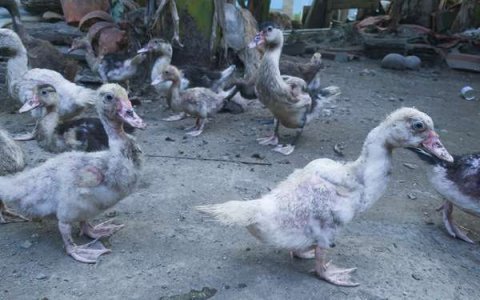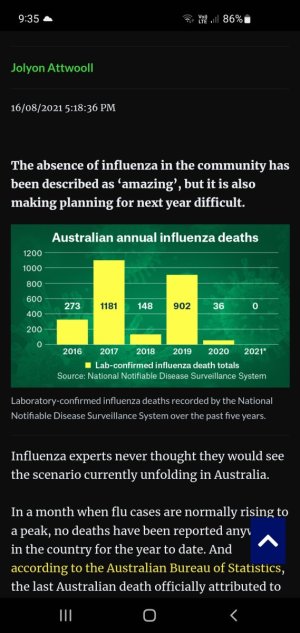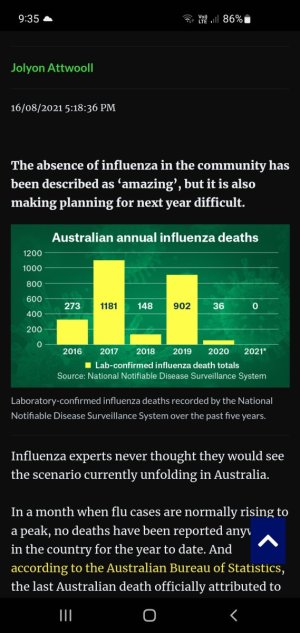Flu fighters: Experts warn of avian threat looming Down Under
- Replies 35
As global health concerns continue to evolve, new threats emerge that demand our attention and preparedness.
Among these, one particular issue has garnered increasing scrutiny from experts and the public alike. If not properly addressed, this potential threat could have significant implications for public health and safety.
Understanding the factors contributing to its rise and the measures being proposed to mitigate its impact is crucial for staying informed and ready for what may lie ahead.
Following the discovery that the lethal avian flu has crossed species in Australia and is now affecting a duck farm, a prominent food safety expert warned that the virus could further mutate and potentially spread to pigs—‘the next step towards a human infection’.
The H7N3 strain of bird flu, a highly contagious variant, was detected at six properties in Victoria, prompting the culling of hundreds of thousands of birds as a precautionary measure.

Professor Enzo Palombo, a Food Health and Safety Expert at Swinburne University, urged calm, stating that ‘there's no need to panic’ and ‘no real sense that anything significant is happening locally which we should be concerned about’ at the time being.
However, he also acknowledged the potential for the virus to 'come across to humans more readily and cause problems,' which ‘could end up being the start of the next pandemic’.
According to Professor Palombo, ‘the real concern from a public health point of view’ would be if ‘what's happening in the US with mammals’ happens Down Under.
‘I don't believe it constitutes a major public health threat here yet, but I think what's most concerning is what's happening in the US with the dairy cattle, there have been documented transmissions from cattle to humans, most likely through milk,’ Professor Palombo explained.
‘The virus seems to be infecting the udders, and it seems to be shared through milk, which tests showed had live virus in it.’
He noted that if the virus were to transition from cows to pigs, ‘that scenario being much more frightening than any potential spread through food’.
‘Pigs are notoriously the animals in which all these flu viruses tend to mix up and come out as new versions,’ he pointed out.
‘It's concerning because the bird flu virus doesn't grow well in humans, but it does in pigs, so the pigs [are] becoming this melting pot of different viruses.’
The global reach of the virus is evident, with cases reported in wildlife as far-flung as the penguins of Antarctica, a testament to the role of migratory birds in its spread.
Laboratory experiments have shown that bird flu strains can infect ferrets, suggesting that the virus could potentially pose a significant threat to humans.
‘’You're probably thinking, why does that matter? Well, ferrets are a model used in laboratories to mimic human infection. Now, if it can infect and make a ferret sick, and they mostly died in that experiment, that means it could come across to humans more readily and cause problems,’ Professor Palombo explained.
‘So all these things sort of have people starting to think, hang on, something's ticking over here, and it could end up being the next pandemic. We don't want to alarm people. But this is how it happens with these viruses. They don't follow any rules; they do what they want to do.’
When asked about the probability of the virus reaching a significant threat level in Australia, Palombo described it as ‘minimal’ but not entirely impossible.
‘Well, if you asked me that question about COVID in March 2020, I'd have said minimal risk then too, but then look what happened? We just don't know. It could be the next pandemic; it could all blow over, and we go back to normal,’ he clarified.
The impact of the bird flu outbreak was already felt in the Australian food supply chain, with Coles supermarkets imposing a temporary limit of two cartons of eggs per customer nationwide, excluding Western Australia.
The strain affecting Victoria differs from the H5N1 variant, which has spread to a wide range of wild and domestic mammal species, poultry, and migratory birds.
The current H7N3 outbreak has remained confined to poultry, unlike H5N1, which has also led to sporadic human cases, such as in the case in March when a boy returning to Australia from India was found to be infected.
 Have you noticed any changes in your local area regarding poultry or egg availability? Are you taking any precautions to protect yourself from potential bird flu exposure? We invite you to share your thoughts and concerns about this issue.
Have you noticed any changes in your local area regarding poultry or egg availability? Are you taking any precautions to protect yourself from potential bird flu exposure? We invite you to share your thoughts and concerns about this issue.
Among these, one particular issue has garnered increasing scrutiny from experts and the public alike. If not properly addressed, this potential threat could have significant implications for public health and safety.
Understanding the factors contributing to its rise and the measures being proposed to mitigate its impact is crucial for staying informed and ready for what may lie ahead.
Following the discovery that the lethal avian flu has crossed species in Australia and is now affecting a duck farm, a prominent food safety expert warned that the virus could further mutate and potentially spread to pigs—‘the next step towards a human infection’.
The H7N3 strain of bird flu, a highly contagious variant, was detected at six properties in Victoria, prompting the culling of hundreds of thousands of birds as a precautionary measure.

The lethal avian flu strain H7N3 infected ducks in Australia, prompting fears of further spread to other species, including humans. Credit: Shutterstock
Professor Enzo Palombo, a Food Health and Safety Expert at Swinburne University, urged calm, stating that ‘there's no need to panic’ and ‘no real sense that anything significant is happening locally which we should be concerned about’ at the time being.
However, he also acknowledged the potential for the virus to 'come across to humans more readily and cause problems,' which ‘could end up being the start of the next pandemic’.
According to Professor Palombo, ‘the real concern from a public health point of view’ would be if ‘what's happening in the US with mammals’ happens Down Under.
‘I don't believe it constitutes a major public health threat here yet, but I think what's most concerning is what's happening in the US with the dairy cattle, there have been documented transmissions from cattle to humans, most likely through milk,’ Professor Palombo explained.
‘The virus seems to be infecting the udders, and it seems to be shared through milk, which tests showed had live virus in it.’
He noted that if the virus were to transition from cows to pigs, ‘that scenario being much more frightening than any potential spread through food’.
‘Pigs are notoriously the animals in which all these flu viruses tend to mix up and come out as new versions,’ he pointed out.
‘It's concerning because the bird flu virus doesn't grow well in humans, but it does in pigs, so the pigs [are] becoming this melting pot of different viruses.’
The global reach of the virus is evident, with cases reported in wildlife as far-flung as the penguins of Antarctica, a testament to the role of migratory birds in its spread.
Laboratory experiments have shown that bird flu strains can infect ferrets, suggesting that the virus could potentially pose a significant threat to humans.
‘’You're probably thinking, why does that matter? Well, ferrets are a model used in laboratories to mimic human infection. Now, if it can infect and make a ferret sick, and they mostly died in that experiment, that means it could come across to humans more readily and cause problems,’ Professor Palombo explained.
‘So all these things sort of have people starting to think, hang on, something's ticking over here, and it could end up being the next pandemic. We don't want to alarm people. But this is how it happens with these viruses. They don't follow any rules; they do what they want to do.’
When asked about the probability of the virus reaching a significant threat level in Australia, Palombo described it as ‘minimal’ but not entirely impossible.
‘Well, if you asked me that question about COVID in March 2020, I'd have said minimal risk then too, but then look what happened? We just don't know. It could be the next pandemic; it could all blow over, and we go back to normal,’ he clarified.
The impact of the bird flu outbreak was already felt in the Australian food supply chain, with Coles supermarkets imposing a temporary limit of two cartons of eggs per customer nationwide, excluding Western Australia.
The strain affecting Victoria differs from the H5N1 variant, which has spread to a wide range of wild and domestic mammal species, poultry, and migratory birds.
The current H7N3 outbreak has remained confined to poultry, unlike H5N1, which has also led to sporadic human cases, such as in the case in March when a boy returning to Australia from India was found to be infected.
Key Takeaways
- The deadly avian flu H7N3 strain had spread to ducks in Australia, raising concerns about potential jumps to other species and humans.
- A food safety expert warned that if the virus evolves to transmit among pigs, it could represent a significant public health threat and possibly lead to the next pandemic.
- The virus had already spread globally and had shown the ability to infect ferrets, animals used as models to mimic human infection, indicating it could pose a risk to humans.
- The bird flu outbreak has affected the egg supply in Australia, prompting Coles supermarkets to enforce a limit on egg purchases while health officials continue to monitor the situation carefully.










